AT&T Workers on Strike in 9 Southeastern States; Expect “Week-Long” Delays for Repairs, New Installs
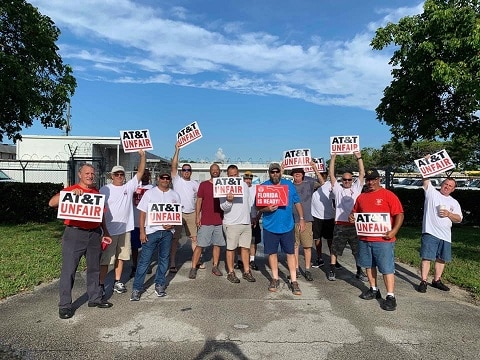
More than 20,000 AT&T workers are on strike in nine southeastern states. (Image: CWA Local 3)
AT&T customers in nine southeastern states can expect long delays getting new service installed and existing service repaired as a result of a strike by AT&T workers that began last weekend.
More than 20,000 AT&T technicians and customer service personnel that belong to the Communications Workers of America walked off the job on Saturday citing unfair working conditions including reduced paid sick time, increased responsibilities for overworked technicians, a mandatory requirement that employees be ready to report to work anytime day or night, and other work and benefit changes.
CWA officials claim their last official pre-strike talks with company officials were held August 20. A decision to strike was taken after AT&T sent corporate labor relations experts to the bargaining table with no authority to make contract decisions, which the union called “disrespectful.”
“It turns out that for over three months, we have been bargaining with people who do not have the real authority to make proposals or to reach an agreement with us,” officials at CWA Local 3 complained. “AT&T has also changed to rules of the game by changing our agreement about how we meet and bargain. As a result, CWA was forced to file unfair labor practice charges against AT&T for bargaining in bad faith.”
The strike affects AT&T residential and business customers in Alabama, Florida, Georgia, Kentucky, Louisiana, Mississippi, North Carolina, South Carolina and Tennessee. Customers started noticing the impact of the strike almost immediately.
“My son started UAB today, and my daughter is starting school tomorrow,” said AT&T customer Cynthia Young in Clay, a suburb of Birmingham, Ala., who lost service a few days ago. “Everything they do nowadays is on Google Classroom or some other platform on the internet.”
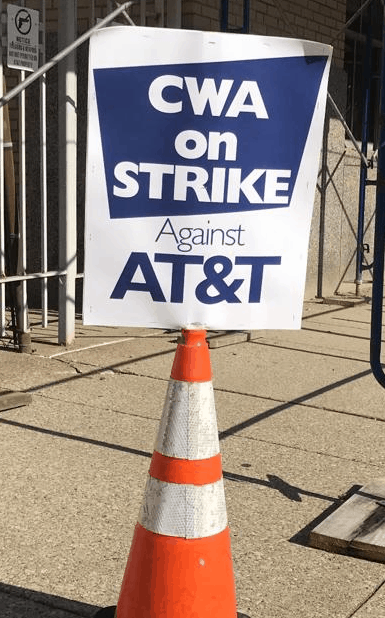 Young told WBRC-TV that an AT&T technician did not appear for a scheduled repair call, and the company is now giving her and other customers “the runaround.”
Young told WBRC-TV that an AT&T technician did not appear for a scheduled repair call, and the company is now giving her and other customers “the runaround.”
“No one called. We had a scheduled appointment. I understand things are going on but someone could have called, or, I could have gotten a text message saying, ‘due to unforeseen circumstances we could not keep your appointment. We will be in contact with you to reschedule’. You know, something that’s just good business,” complained Young.
Another Birmingham customer was told repair appointments now take more than a week, and her last appointment resulted in a no-show by AT&T technicians.
AT&T claimed it was surprised by CWA’s decision to strike, which the company says came without warning.
“We’re surprised and disappointed that union leaders would call for a strike at this point in the negotiations, particularly when we’re offering terms that would help our employees,” AT&T said in a statement. “We remain ready to sit down with union leaders to negotiate a new, improved contract for our employees. We listen, engage in substantive discussions and share proposals back and forth until we reach agreement. We are prepared for a strike and in the event of a work stoppage, we will continue working hard to serve our customers.”
The workers four-year contract with AT&T expired on Aug. 3, but both sides agreed to continue talks to find a compromise. The decision to strike came after union officials learned they were negotiating with company representatives that had no authority to negotiate. CWA said further talks were pointless until AT&T sent negotiators that can sign a new agreement.
AT&T employees in the affected region tell Stop the Cap! that service calls are being managed by some managers and supervisors until out of area contractors and employees can be brought in. Only high priority outages and urgent maintenance work is being completed. Routine service calls and new installations are being scheduled more than a week out or postponed altogether. If the strike lingers into several weeks, customers should be prepared for no-show service calls and additional delays.
WAGA in Atlanta interviews a CWA representative about what AT&T is offering vs. what they are distorting in their PR campaign. (2:18)
WXIA in Atlanta visits an AT&T picket line and explains what the strike is all about. (2:08)
WBRC in Birmingham, Ala. reports some AT&T customers are finding long delays getting service installed or repaired. (2:04)


 Subscribe
Subscribe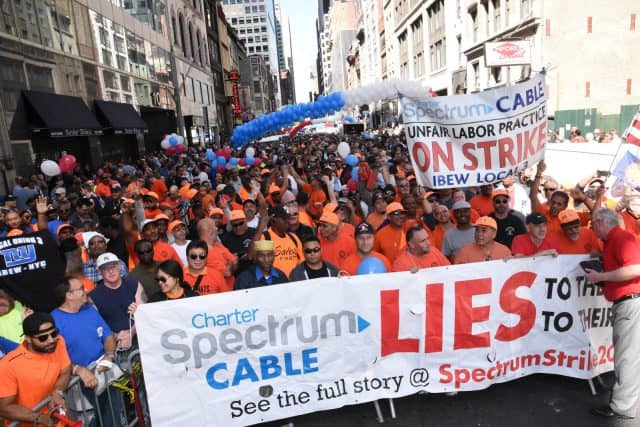

 For the last year and a half, while Charter/Spectrum has been accused of dragging its feet on rural broadband rollouts across New York State and is now threatened with franchise revocation, the company had plenty of time to spare waiting out the International Brotherhood of Electrical Workers Local 3, who have been on strike to protest a pay-and-benefits-race-to-the-bottom in the New York City.
For the last year and a half, while Charter/Spectrum has been accused of dragging its feet on rural broadband rollouts across New York State and is now threatened with franchise revocation, the company had plenty of time to spare waiting out the International Brotherhood of Electrical Workers Local 3, who have been on strike to protest a pay-and-benefits-race-to-the-bottom in the New York City. The David vs. Goliath battle has also put enormous strain on some affected families. Some have quit the company and looked for employment elsewhere, some others have returned to work and abandoned the strike, leaving holdouts hoping for a breakthrough.
The David vs. Goliath battle has also put enormous strain on some affected families. Some have quit the company and looked for employment elsewhere, some others have returned to work and abandoned the strike, leaving holdouts hoping for a breakthrough.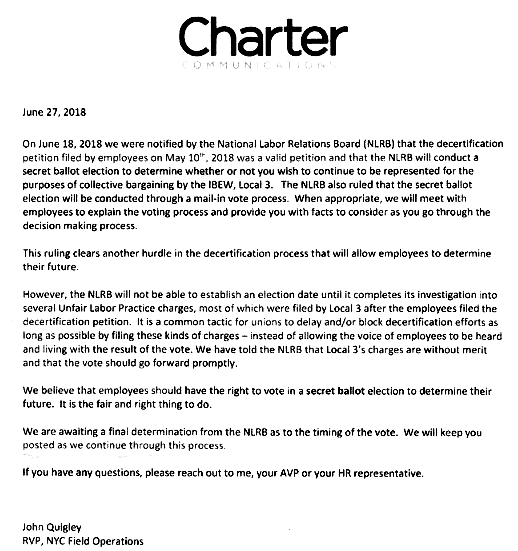


 “They basically said that until we agree that they don’t have to contribute to our pension and health plan, they won’t talk about anything else,” Chris Erikson, business manager of Local 3,
“They basically said that until we agree that they don’t have to contribute to our pension and health plan, they won’t talk about anything else,” Chris Erikson, business manager of Local 3, 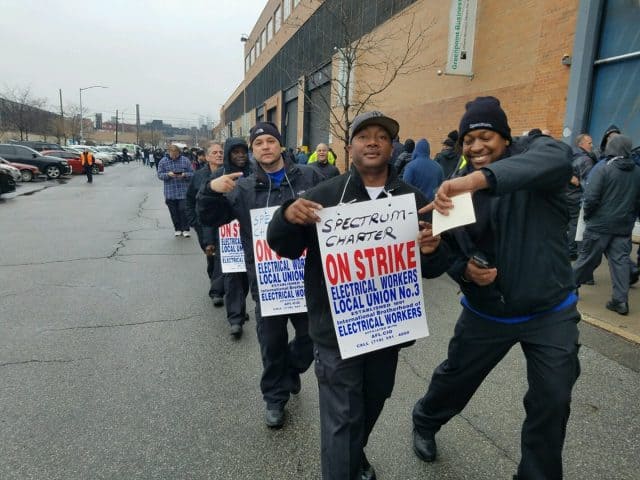
 The Daily News
The Daily News 